Child counseling Services Orlando is a specialized form of therapy that focuses on addressing the emotional, behavioral, and social well-being of children and adolescents.
It provides a safe and supportive environment for children to express themselves, learn coping skills, and work through challenges they may be facing.
Child counseling is designed to support children in navigating various issues such as anxiety, depression, trauma, behavioral difficulties, and family disruptions.
It is conducted by trained professionals who have expertise in child development and therapeutic techniques suitable for young individuals.
Child counselors use age-appropriate interventions to help children express their emotions, develop resilience, and improve their overall mental health.
Emotional Well-being: Discover how child counseling promotes emotional well-being by helping children express and manage their emotions in a healthy way.
Coping Skills Development: Learn about the strategies and techniques used in child counseling to teach children effective coping skills for managing stress, anxiety, and other challenges.
Behavioral Modification: Explore how child counseling addresses behavioral difficulties by identifying underlying causes and implementing appropriate interventions.
Trauma Recovery: Understand how child counseling supports children in processing and recovering from traumatic experiences, promoting healing and resilience.
Child counseling provides a nurturing and empathetic space for children to explore their thoughts, feelings, and experiences.
Child counselors utilize a range of therapeutic approaches, including play therapy, art therapy, cognitive-behavioral therapy, and talk therapy, to engage children in the healing process.
They create a trusting and safe environment where children can express themselves freely, learn coping strategies, and develop skills to manage challenges more effectively.
Through the therapeutic relationship, children gain self-awareness, build resilience, and develop healthier patterns of thinking and behaving.
4 Benefits Child Counseling Services Orlando:
| ✅ Benefit | ✅ Description |
| ✔ Emotional Well-being | ✔ Promotes emotional awareness and helps children develop healthy ways of expressing and managing their emotions. |
| ✔ Coping Skills Development | ✔ Equips children with effective strategies to cope with stress, anxiety, and other challenges. |
| ✔ Behavioral Modification | ✔ Addresses problematic behaviors by identifying underlying causes and implementing appropriate interventions. |
| ✔ Trauma Recovery | ✔ Supports children in processing and recovering from traumatic experiences, promoting healing and resilience. |
Key Takeaway
Child counseling fosters emotional well-being by providing a safe space for children to express and navigate their emotions.
Children learn effective coping strategies to manage stress, anxiety, and other challenges they may face.
Child counseling helps address problematic behaviors by identifying their underlying causes and implementing appropriate interventions.
Child counselors support children in processing and healing from traumatic experiences, facilitating their recovery and resilience.
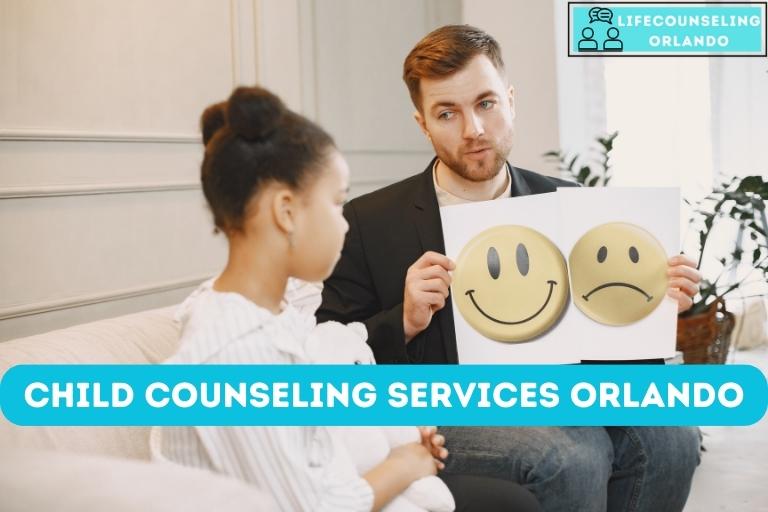
Five Facts About: Child Counseling Services Orlando:
Fact 1: Child counseling utilizes developmentally appropriate therapeutic techniques tailored to the child’s age, understanding, and needs.
Fact 2: Play therapy is a commonly used approach in child counseling, as it allows children to express themselves and work through challenges in a natural and engaging way.
Fact 3: Child counseling can benefit children dealing with various issues, including anxiety, depression, behavioral problems, trauma, and family disruptions.
Fact 4: Parental involvement is often an integral part of child counseling, as parents are key collaborators in supporting the child’s progress and well-being.
Fact 5: Child counseling sessions typically last around 45 minutes to one hour, with the frequency determined based on the child’s needs and progress.
Child Counseling Services
Child Counseling Services Orlando is far different than my work with teens and individuals. It’s important to understand the thought process and developmental milestones of children in order to effectively relate to them.
Children can benefit from counseling. Therapy can assist them in developing the problem-solving skills they need.
My role as their therapist is to help the children and their families learn to cope with life stress and how it affects so many of our children today.
It assist with many issues such as depression, anxiety, behavioral and emotional issues
Sometimes for kids just like with adults, they can also benefit from counseling.
Children can learn in session how to develop better coping skills and problem solving techniques.
They learn to ask for help as well as build their confidence.
We often tend to forget that children need just as much if not more assistance in understanding this world.
They look up to their parents. If that foundation is shaky then what kind of security is set into place for the child. None.
Kids also need extra support and help when dealing with stress from school.
Homework, anxiety, bullying and pressure to perform are all real and heavy for children today.
While other children will need support in discussing feeling related to self and their families. Others need help to discuss their feelings about family issues.
This is especially true during a divorce, a serious illness or any major transition.
- Developmental delays in their speech and language
- Behavioral problems (excessive amounts of anger, acting out, bed wetting at an older age and issue with early onset of an eating disorder.)
- Drop in grades and school performance. Sudden lack of interest.
- Prolonged episodes of sadness or depression.
- Withdrawal and sudden isolation from others.
- The victimization of bullying or the act of bullying other children.
- A decrease in activities they once enjoyed,
- Sudden onset of aggressive behavior ( biting, or hitting)
- Rapid of sudden changes in their appetite.
- Sleep problems such as insomnia.
- School tardiness
- Unexplained mood swings (happy one minute then upset the next).
- Complaints of headaches, stomachaches, or overall just not feeling well).
- Problems stemming from the transition of a divorce, separation or move to another home.
- Issues of bereavement and loss.
Therapy after a sexual abuse as well as emotional abuse or any other traumatic event.
There are various reasons and wonderful benefits for your child. In therapy they are able to open up and freely talk. They are given the safety and security to speak with someone outside of the family system.
Many during a tough divorce feel they must hold in their emotions and be tough for their parents.
Through methods such as Play therapy and Cognitive behavioral therapy your child can learn to process their thoughts and will get back on track to being a kid again. Child Counseling Services Orlando is a great place to start the healing.
Seek the help you need for your child’s conduct.
Is your child bossy. Seek the help you need today.
What are the signs and are we diagnosing children correctly today?
Understanding how a child is conditioned by parents. How does codependency start and when should a kid be allowed to just be a kid.
Who is in control of your household? Are you afraid of your child’s reaction if they get upset. Understand how this role reversal happens and what needs to be done.
Introduction
Child counseling, also known as child therapy or child psychotherapy, is a form of therapy specifically tailored to address the unique needs and challenges faced by children.
It involves creating a safe and supportive environment where children can freely express their thoughts, feelings, and concerns.
Through counseling, children are guided in developing healthy coping mechanisms, improving their emotional intelligence, and acquiring skills to navigate life’s challenges.
Child counseling is essential as it provides children with the necessary tools to navigate through emotional difficulties, behavioral issues, trauma, and other challenges they may encounter.
It helps them build resilience, develop effective communication skills, and foster a positive self-image.
By addressing these concerns early on, child counseling plays a crucial role in shaping a child’s emotional well-being and future success.
Common Challenges Faced by Children
Children face a variety of challenges that can significantly impact their emotional and psychological well-being.
Here are some common difficulties that child counseling can address:
Emotional Difficulties
Children, like adults, experience a wide range of emotions. However, they may struggle with understanding and managing their emotions effectively.
Child counseling can help children develop emotional intelligence, enabling them to identify and express their emotions in a healthy manner.
Counselors employ various techniques, such as play therapy, to help children explore and process their emotions.
Behavioral Issues
Behavioral issues, such as aggression, defiance, or withdrawal, can be manifestations of underlying emotional or psychological challenges.
Child counseling provides a supportive environment where children can explore the root causes of their behaviors.
By addressing these underlying issues, counselors can guide children towards developing more positive and adaptive behaviors.
Trauma and Abuse
Children who have experienced trauma or abuse require specialized counseling to help them heal and recover.
Child counselors trained in trauma-informed care utilize evidence-based approaches to address the specific needs of these children.
Through counseling, children can work through their traumatic experiences, develop resilience, and restore a sense of safety and trust.
Benefits of Child Counseling
Child counseling offers numerous benefits that positively impact a child’s overall well-being.
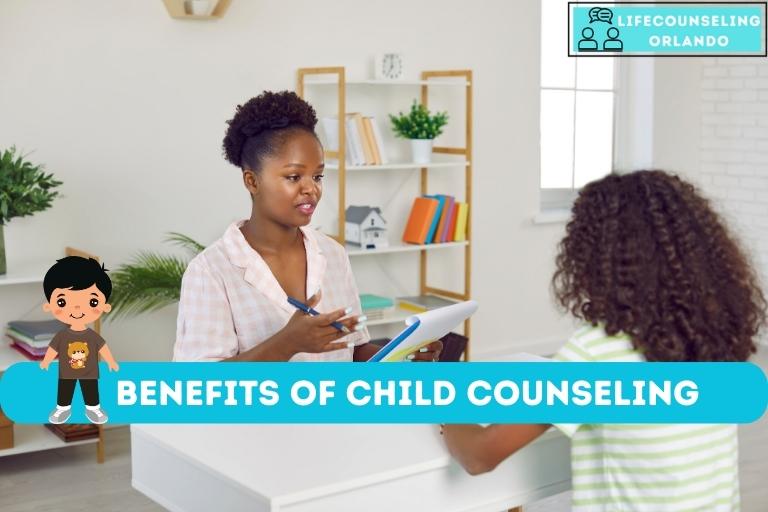
Here are some key advantages:
Emotional Well-being
Child counseling helps children develop emotional resilience and healthy coping strategies.
By exploring their emotions and receiving guidance from a trained counselor, children can better understand and manage their feelings.
This leads to improved emotional well-being, reducing the risk of developing long-term psychological issues.
Improved Communication Skills
Effective communication is a crucial life skill. Child counseling provides children with a safe space to express themselves, fostering the development of clear and effective communication skills.
Counselors employ various techniques, such as role-playing and expressive therapies, to enhance a child’s ability to express their thoughts, feelings, and needs confidently.
Enhanced Problem-Solving Abilities
Children face numerous challenges and conflicts as they grow and interact with others.
Child counseling equips children with problem-solving techniques, encouraging them to think critically and find creative solutions.
This skill set is valuable not only in childhood but throughout their lives.
Approaches and Techniques in Child Counseling
Child counseling utilizes various approaches and techniques to engage children effectively and facilitate their healing and growth.
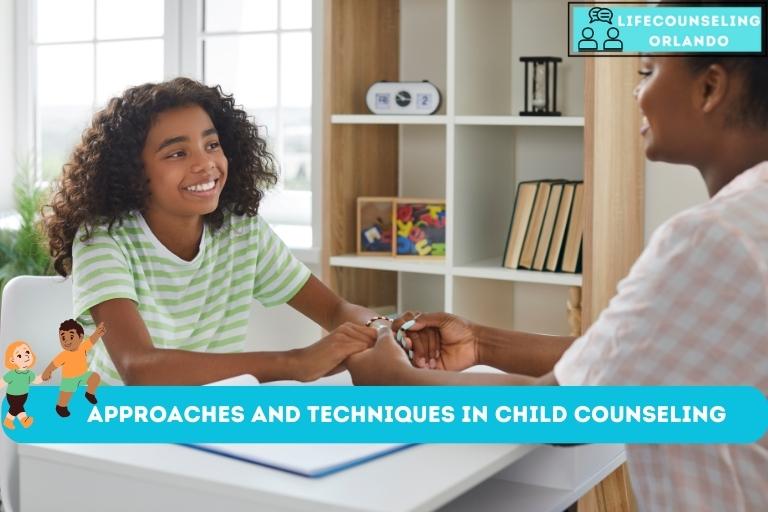
Here are three commonly used approaches:
Play Therapy
Play therapy is a powerful tool used in child counseling to engage children in a therapeutic process.
Through play, children can express their thoughts, emotions, and experiences in a natural and non-threatening manner.
Play therapy can take various forms, including imaginative play, art therapy, and sandplay therapy.
HTML Example:
- Play therapy sessions often involve the use of toys, puppets, and art materials to facilitate self-expression and exploration.
Cognitive-Behavioral Therapy (CBT)
Cognitive-behavioral therapy (CBT) is a widely used therapeutic approach that focuses on the connection between thoughts, feelings, and behaviors.
In child counseling, CBT helps children identify and challenge negative thoughts and beliefs, develop positive coping strategies, and modify maladaptive behaviors.
HTML Example:
- CBT techniques may involve keeping a thought diary, practicing relaxation exercises, and gradually facing fears through exposure therapy.
Art Therapy
Art therapy harnesses the expressive power of art to help children communicate and process their emotions.
Through various art mediums, such as painting, drawing, and sculpting, children can externalize their feelings and experiences.
Art therapy can be particularly effective for children who may struggle to express themselves verbally.
HTML Example:
- Art therapy sessions may involve creating a visual journal, using different colors to represent emotions, or sculpting clay to symbolize their experiences.
Role of the Counselor in Child Counseling
Child counselors play a vital role in creating a safe and supportive environment for children to explore their thoughts and emotions.
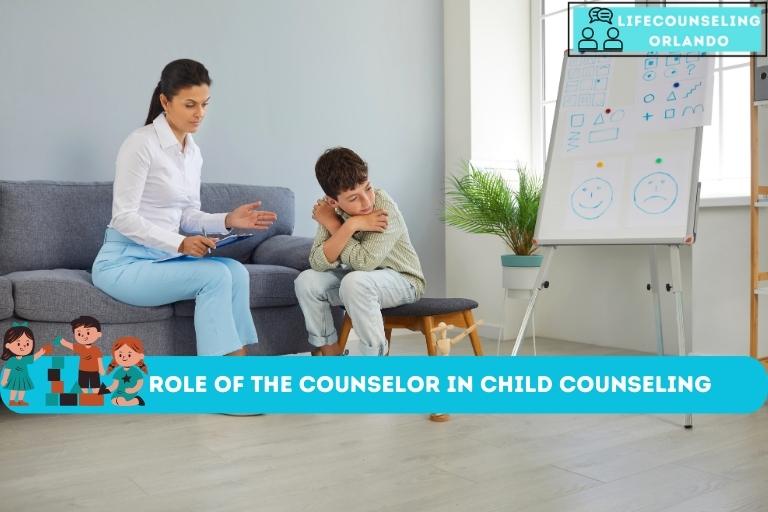
Here are some key aspects of their role:
Building Rapport and Trust
Establishing a strong rapport and trust is crucial in child counseling.
Counselors build connections with children by actively listening, showing empathy, and validating their experiences.
By fostering a trusting relationship, counselors can create a safe space where children feel comfortable sharing their concerns.
Creating a Safe and Supportive Environment
Child counselors create an environment that encourages open expression and emotional growth.
They ensure confidentiality, provide emotional support, and maintain clear boundaries.
A safe and supportive environment allows children to feel secure and empowers them to explore their thoughts and feelings without judgment.
Collaboration with Parents and Caregivers
Child counselors work closely with parents and caregivers to ensure a holistic approach to a child’s well-being.
They provide guidance and support to parents, helping them understand and respond to their child’s emotional needs.
Collaboration with parents and caregivers enhances the effectiveness of child counseling by extending therapeutic interventions to the child’s home environment.
How to Choose a Child Counselor
Choosing the right child counselor is crucial for ensuring effective therapy.
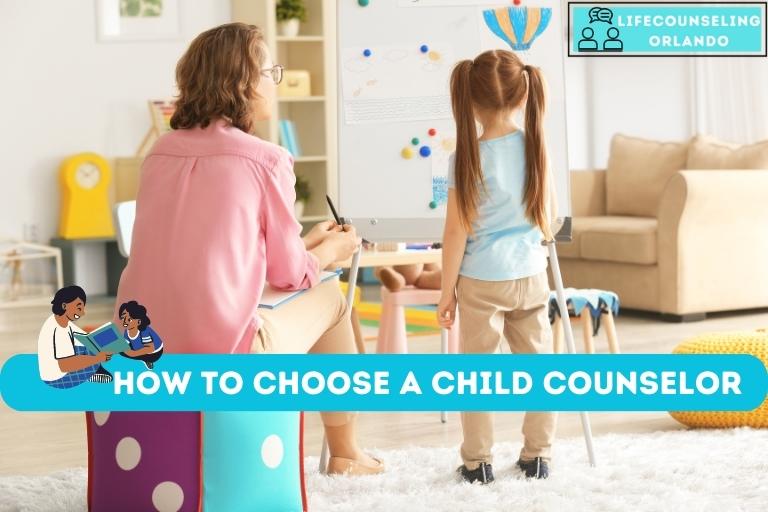
Here are some factors to consider when selecting a child counselor:
Credentials and Qualifications
Verify the counselor’s credentials and qualifications. Look for professionals who are licensed or certified in child counseling or a related field.
Credentials provide assurance that the counselor has met specific standards of education, training, and ethical practice.
Experience Working with Children
Experience working with children is essential when choosing a child counselor.
Counselors who specialize in child counseling have a deep understanding of developmental stages, behavioral patterns, and age-appropriate interventions.
Their experience enables them to tailor their approach to meet the unique needs of each child.
Compatibility and Rapport
It is crucial to find a child counselor with whom your child feels comfortable and connected.
Schedule an initial consultation or interview to assess the counselor’s compatibility with your child.
A positive rapport between the counselor and the child enhances the therapeutic process and promotes better outcomes.
The Process of Child Counseling
Child counseling typically follows a structured process that involves several stages.
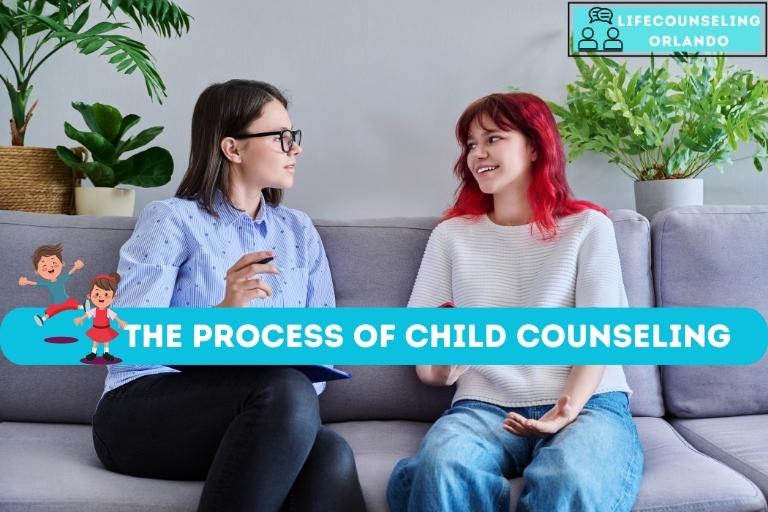
Here is an overview of the general process:
Assessment and Evaluation
The counselor conducts an initial assessment to gather information about the child’s concerns, background, and goals for therapy.
This evaluation helps the counselor understand the child’s unique needs and develop an individualized treatment plan.
Goal Setting
Once the assessment is complete, the counselor collaborates with the child and their parents or caregivers to set specific therapy goals.
These goals provide a roadmap for the counseling process and serve as benchmarks for tracking progress.
Intervention and Therapy Sessions
Counseling sessions are tailored to the child’s age, developmental level, and specific needs.
The counselor utilizes appropriate techniques, such as play therapy, CBT, or art therapy, to engage the child in therapeutic activities.
Therapy sessions focus on addressing the identified concerns, developing coping skills, and promoting emotional growth.
FAQ of Child Counseling Services Orlando
What age range does child counseling typically cover?
Child counseling can benefit children of various ages, ranging from preschoolers to adolescents. Counselors adapt their approaches and techniques based on the child’s developmental stage and individual needs.
How long does child counseling usually last?
The duration of child counseling depends on several factors, including the child’s specific concerns and progress. Some children may benefit from short-term counseling, while others may require longer-term support. The counselor will work collaboratively with the child and their parents to determine the most appropriate duration.
Is child counseling confidential?
Child counseling follows strict confidentiality guidelines. However, there are limitations to confidentiality when the child’s safety or the safety of others is at risk. Counselors discuss confidentiality boundaries with the child and their parents at the beginning of therapy.
What if my child doesn’t want to attend counseling?
It is common for children to feel hesitant or resistant about attending counseling initially. Open communication, explaining the benefits of counseling, and involving the child in the decision-making process can help alleviate their concerns. A skilled child counselor can also create a welcoming environment that encourages the child’s active participation.
Can parents be involved in the counseling process?
Yes, parents and caregivers are an integral part of the child counseling process. Collaboration between the counselor and parents ensures consistent support for the child’s emotional well-being. Counselors may offer parent education, guidance, and involve parents in specific therapy sessions or activities.
Conclusion
Child counseling plays a crucial role in supporting the emotional well-being and development of children.
By addressing emotional difficulties, behavioral issues, and trauma, child counseling equips children with the necessary tools to navigate life’s challenges successfully.
Through a variety of approaches and techniques, child counselors create a safe and supportive environment where children can express themselves and acquire valuable skills.
Choosing the right child counselor and understanding the counseling process are essential for ensuring the best possible outcomes for children in need of therapeutic support.
